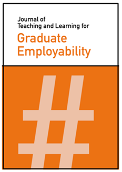Predicting students’ work world awareness through their readiness and competency for the digital world
DOI:
https://doi.org/10.21153/jtlge2024vol15no1art1788Abstract
In the current fast-paced digital work environment, it has become crucial for individuals to cultivate a deep understanding of the constantly changing nature of the job market. With jobs and career paths becoming increasingly indistinct and unpredictable, developing awareness of the digital work world is more important than ever. This research empirically investigated the degree to which the world of work readiness and competency of distance learning students could serve as predictors for their digital work world awareness. Data were collected from (N = 486) full-time employed undergraduate students at a comprehensive South African distance learning institution. Regression analysis and structural equation modelling were used in the cross-sectional, quantitative study. The study emphasised the significance of developing job certitude, business ingenuity and socio-digital agility as part of students’ career development learning to improve their awareness of the digital work environment. The study enhanced comprehension of the implicit function of students’ work readiness and competency in relation to significant digital-era awareness.References
Abessolo, M., Rossier, J., & Hirschi, A. (2017). Basic values, career orientations and career anchors: Empirical investigation of relationships. Frontiers in Psychology, 8, 1556. https://doi.org/10.3389/fpsyg.2017.01556
Al-Asfour, A., Tlaiss, H.A., & Shield, S.W. (2021). Work experiences of native Americans: A qualitative study. Journal of Career Development, 48(2), 105-119. https://doi.org/10.1177/0894845319832129
Allen, I.E., & Seaman, C.A. (2007). Likert scales and data analysis. Quality Progress, 40, 64-65. https://www.bayviewanalytics.com/reports/asq/likert-scales-and-data-analyses.pdf
AlKhemeiri, A.K., Khalid, K. & Musa, N. (2020). The role of career competencies and proactive personality in early-career employee career adaptability. European Journal of Training and Development, 45(4/5), 285-300. https://doi.org/10.1108/EJTD-05-2020-0081
Autin, K.L., & Allan, B.A. (2020). Socioeconomic privilege and meaningful work: A psychology of working perspective. Journal of Career Assessment, 28(2), 241-256. https://doi.org/10.1177/1069072719856307
Clinkard, M. (2018). Are employability and entrepreneurial measures for higher education relevant? Introducing Agile reflection. Journal of Industry and Higher Education, 32(6). https://doi.org/10.1177/0950422218808625
Coetzee, M. (2022). Career agility for purposive career exploration: Role of adult learners’ career orientations and digital-era world of work awareness. African Journal of Career Development, 4(1), a54. https://doi.org/10.4102/ajcd.v4i1.54
Coetzee, M., Ferreira, N. & Potgieter, I.L. (2019). Employer requirements and employability mindsets influencing graduate workers’ self-confidence in gaining employment. African Journal of Career Development, 1(1), a4. https://doi.org/10.4102/ajcd.v1i1.4
Coetzee, M., Ferreira, N. & Potgieter, I.L. (2021). World of work orientation scale. [Unpublished research report], Department of Industrial and Organisational Psychology, University of South Africa.
Coetzee, M. & Veldsman, D. (2022). The digital-era industrial/organisational psychologist: Employers’ view of key service roles, skills and attributes. South African Journal of Industrial Psychology, 48(0), a1991. https://doi.org/10.4102/sajip.v48i0.1991
Duan, J., Lin, X., Wang, X. & Xu, Y. (2022). How organizational cultures shape social cognition for newcomer voices. Journal of Occupational and Organizational Psychology, 95(3), 577-738. https://doi.org/10.1111/joop.12390
Gaglio, C.M. & Winter, S. (2017). Entrepreneurial Alertness and Opportunity Identification: Where are we now? In M Brannback & A.L. Carsrud (Eds.), Revisiting the entrepreneurial mind. Inside the black box: An expanded edition (pp. 339-358. Springer International. https://doi.org/10.1007/978-3-319-45544-0_21
Hair, J.F., Black, W., Babin, B.J. & Anderson, R.E. (2010). Multivariate data analysis: a global perspective. 7th edition. Pearson.
Hernandez-Lopez, L., Garcia-Almeida, D.J., & Ballesteros-Rodriquez, J.L. (2016). Students’ perceptions of the lecturer’s role in management education: knowledge acquisition and competence development. International Journal of Management Education, 14(3), 411-421. https://doi.org/10.1016/j.ijme.2016.10.001
Hite, L.M. & McDonald, K.S. (2020). Careers after COVID-19: challenges and changes. Human Resource Development International, 23(4), 427-437. https://doi.org/10.1080/13678868.2020.1779576
IBM Corp. (2021). IBM SPSS Statistics for Windows (Version 28.0) [Computer software]. IBM Corp.
Industry Week. (2020). Trends impacting the future of work. https://www.industryweek.com/covid19/article/21130761/9-trends-impactingthe-future-of-work
Irfransyah, A., Suparji, Suprianto, B., Kuntadi, C., & Sudarmaji, H. (2023). Factors that affect the quality of vocational education graduates in the 4.0 era: Job readiness, skills and digital services. Dinasti International Journal of Education Management and Social Science, 4(4), 485-496. https://doi.org/10.31933/dijemss.v4i4.1734
Jackson, D. & Dean, B.A. (2022). The contribution of different types of work-integrated learning to graduate employability. Higher Education Research & Development, 42(1), 93-110. https://doi.org/10.1080/07294360.2022.2048638
Keogh, J., Maguire, T. & O’Donoghue, J. (2015). Graduate work-readiness in the 21st century. Proceedings of Higher Education in Transformation Conference, Dublin, Ireland, 385–395. https://arrow.tudublin.ie/cgi/viewcontent.cgi?article=1004&context=st4
Miralles, F., Giones, F. & Riverola, C. (2015). Evaluating the impact of prior experience in entrepreneurial intentions. International Entrepreneurial and Management Journal, 12, 791-813. https://doi.org/10.1007/s11365-015-0365-4
Olo, D., Correia, L. & Rego, C. (2021). How to develop higher education curricula towards employability? A multi-stakeholder approach. Education + Training, 64(1), 89-106. https://doi.org/10.1108/ET-10-2020-0329
Potgieter, I.L., Ferreira, N., & Coetzee, M. (2019). Theory, research and dynamics of career wellbeing: Becoming fit for the future. Springer Nature. https://doi.org/10.1007/978-3-030-28180-9
Paul, J., Alhassan, I., Binsaif, N. & Singh, P. (2023). Digital entrepreneurship research: A systematic review. Journal of Business Research, 156. https://doi.org/10.1016/j.jbusres.2022.113507
Ramnund-Mansingh, A. & Reddy, N. (2021). South African specific complexities in aligning graduate attributes to employability. Journal of Teaching and Learning for Graduate Employability, 12(2), 206–221. https://doi.org/10.21153/jtlge2021vol12no2art1025
Tomlinson, M. & Holmes, L. (2012). Graduate employability: A review of conceptual and empirical themes. Higher Education Policy, 25, 407-431. https://doi.org/10.1057/hep.2011.26
Tomlinson, M. (2007). Graduate Employability and Student Attitudes and Orientations to the Labour Market. Journal of Education and Work, 20(4), 285-304. https://doi.org/10.1080/13639080701650164
Ulfert-Blank, A., & Schmidt, I. (2022). Assessing digital self-efficacy: Review and scale development. Computers and Education, 191. https://doi.org/10.1016/j.compedu.2022.104626
Wafa, A., Singh, J. & Kaur, D. (2020). Challenges faced and employability skills that employers seek in fresh graduates in a third world country. International Journal of Psychosocial Rehabilitation. 24(2), 735-748.
Williams, K.E., Hutchings, P.B. & Phelps, C. (2022). Beyond learning in higher education: an evaluation of the ‘Life Design’ initiative to improve student employability. Studies in Higher Education, 47(6), 1184-1198. https://doi.org/10.1080/03075079.2020.1870946
Winterton, J. & Turner, J.J. (2019). Preparing graduates for work readiness: an overview and agenda. Education + Training, 61(5), 536-551. https://doi.org/10.1108/ET-03-2019-0044
Downloads
Published
Issue
Section
License
Copyright (c) 2024 Nadia Ferreira, Melinde Coetzee, Ingrid Lorainne Potgieter

This work is licensed under a Creative Commons Attribution-NonCommercial 4.0 International License.












